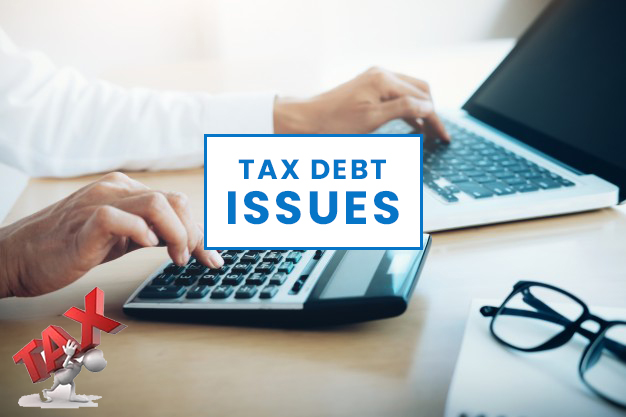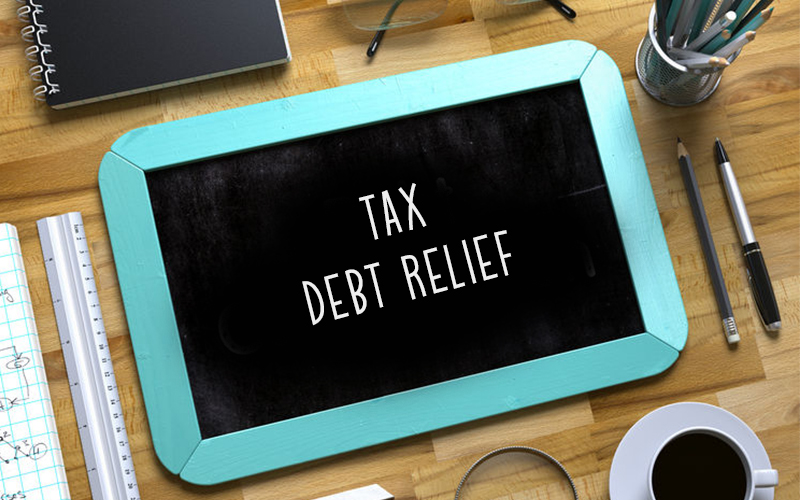Tax Debt Relief: All you need to know about resolving Tax Debt

Tough times seldom come with a knock on the door. Before you know, you could find yourself knee-deep in trouble, struggling to make ends meet. Debt might be piling on your shoulders, but there’s one debt that’s worse than all the other kinds. Most people would agree, there’s nothing scarier than owing a federal tax debt.
If you owe or have owed federal tax debt, then you know what we’re talking about. It’s a stressful situation to be in.
In this article, we’ll answer questions like: how is federal tax debt different from other kinds of debt? What are the common reasons due to which you might face tax debt issues? What is tax debt relief? When is tax debt relief an option for you? And what are the possible solutions to your federal tax debt?
Let’s get into it!
How is Federal Tax Debt different from other kinds of Debt?
Owing money to the government is different from owing money to a bank for a credit card or a loan. The Government, IRS, and states have extensive collection abilities that unsecured creditors do not. They can conduct a legal seizure of your assets like bank accounts. Moreover, they can also withhold income from social security, retirement, or wages without following the traditional legal process.
They may file a tax lien and maybe even seize property like real estate, cars, or other assets you own to pay off your tax debt.
There can be numerous reasons why you might have tax debts. During such times, the most important thing is that you receive the professional assistance you need. Having expert guidance and help can be integral in planning the resolution of tax debt.
Common reasons behind Tax Debt Issues

Let’s take a look at the common reasons due to which you could be facing tax debt issues.
Failure to file Tax Return
Failure to file tax returns is the most common reason why individuals owe money to the State or the IRS. We must clear it right away, it is not against the law to have a tax debt. What’s against the law is the failure to file tax returns once you or your business surpass minimum income requirements.
If you don’t file your returns, the IRS will file a Substitute for Return (SFR). Usually, the SFR will only list your income and not include all of the allowable deductions. This could result in you or your company owing a large amount of taxes, penalties, and interest. Such penalties and interest payment may not be accurate if you had properly filed the tax return.
Error or fault in filing Tax Return
Filing a tax return can be quite complicated for a lot of people to do on their own. You can easily end up making mistakes while filing your tax return. You might rush into the filing process to meet the deadline or forget some important relevant information needed to complete your return.
Even if a Certified Public Accountant (CPA) prepares your returns, it doesn’t guarantee that your tax returns will be error-free. You can also make some mistakes, like omitting to provide some important document to the CPA.
These mistakes can be costly as accuracy penalties can reach up to 75% of the tax debt. So, you must take care to provide all the relevant information on time.
Failure to make tax payments on time
Often, business owners don’t pay their quarterly Estimated Tax Payments (ETP’s) during the year. By doing so, the tax debt accumulates and is carried forward to the following year. If this accumulated debt gets too large, the business may not have the money to pay the balance owed.
IRS or State tax audit
The IRS or state might examine and audit your or your company’s tax returns. Depending on its results, you may be subject to additional taxes owed due to penalties, disallowed deductions or other reasons.
Unqualified or early withdrawal of Retirement funds
If you withdraw your 401(k) IRA before the age of 59 ½ and don’t qualify for the same, the IRS imposes a 10% penalty. A lot of taxpayers who are not expecting this get caught owing the penalty.
Gambling Gains
If you have any winnings from gambling, you must include this income in your tax return. This could mean an increase in taxes due.
Unpaid Payroll Taxes
Payroll taxes are withheld from the salaries of employees. The business holds these funds in trust and are to be subsequently forwarded to the IRS.
If a business fails to do so, the IRS sees it as theft from the employees and from the IRS. This is a very serious situation. Moreover, failure to pay this can also result in personal assessment of the debt, penalties, and fines. So, you must avoid this situation at all costs.
Mistakes from the CPA
Understanding the comprehensive tax code is an extremely difficult task. And to understand it deeply, how it applies to various situations, and the best way to apply it is quite complicated. Moreover, it is important to have an insider’s understanding of the taxing authorities to get the best results.
So, we’ll suggest that instead of doing this yourselves, get in touch with CPAs or tax relief companies like GConnectPro that can help you out.
This is not an exhaustive list of all the reasons behind tax debt issues. These are just a few common issues due to which you might be facing tax debt issues. There can be many other reasons for the same and it depends on your financial position.
What is Tax Debt Relief?

When you can’t afford to pay your tax bill, the government can help you with tax debt relief. This can be in the form of a payment plan or a settlement. In a settlement, the IRS agrees to settle your tax debt for less than the original amount you owe.Debt settlement is also known as an offer-in-compromise.
Tax-debt relief is a broad concept, covering options designed to make peace between defaulting taxpayers and the IRS.
When is Tax Debt Relief an option for you?
You can claim tax debt relief when you owe the IRS money and cannot afford to make the payment.
First things first, you’ll have to actually prepare and file your taxes before you can claim tax debt relief. This is not only the right thing to do, but it’ll also determine exactly how much you owe the IRS.
Once you have filed your return, you’ll know the exact amount you owe. Subsequently, you can explore relief and forgiveness options if you conclude that you lack the resources to pay. Completing your tax return quickly gives you more time to prepare a solid tax debt relief plan. If you delay too much, you’ll probably have limited options to seek relief.
There are some companies, like GConnectPro, that can work on your behalf to help you settle your debt. At GConnectPro, we’ll take care of everything and help you get tax debt relief that you desperately need.
What are the possible solutions to your Federal Tax Debt?
The IRS is one of the most powerful collection agencies in the world. It has numerous powerful tactics to collect tax debt.
But taxpayers must not get stressed. They also have a number of options to resolve their tax debts. Let’s discuss some of the tax debt relief options to resolve your federal tax debt:
1. Installment Agreements
Generally, taxpayers who owe a large tax debt are unable to pay a lump sum to settle their debt. An Installment Agreement gives taxpayers the opportunity to make payments towards their tax debt in smaller, more manageable amounts.
You must also review other options because you might find better solutions than a payment plan.
The ideal payment plan would be a Partial Payment Plan agreement. In this plan, you have to pay a low amount every month and the debt expires due to statute of limitations for collections.
The Fresh Start Payment Plan is typically available for up to $50,000 of tax debt where installments are made over 72 months. Another type of agreement is a full payment installment agreement. This is an agreement between the IRS and the taxpayer to pay the full amount over a period of time. This time is usually 10 years or less.
2. Offer in Compromise
An Offer in Compromise is an agreement between the IRS and a taxpayer to resolve the tax liability for a reduced amount. In certain special circumstances The IRS accepts less than full payment under special circumstances like the following:
- Doubt with respect to amount owed: There must be a genuine dispute as to the tax liability or the amount owed.
- Doubt as to taxpayer’s paying capacity: This is based on the taxpayer’s value of assets versus the full tax liability they face.
3. Penalty Abatement
Penalty abatement is generally available to first-time taxpayers. This is usually tied to an installment agreement. You cannot abate interest unless interest is on the abated penalties.
Penalties can only be abated if the debt is paid in full or paid in full through monthly installments. Taxpayers must show just cause as well as show due diligence in resolving debt and being compliant.
4. Collection Statute Expiration Date
Tax debt must be collected by the Collection Statute Expiration Date, as applied by the IRS. Usually, this is 10 years from the day after the date of assessment. This collection statute expiration date ends the government’s right to continue the collection of the liability.
5. Currently Non-collectible
This is a consideration which the IRS can make to halt collection from a taxpayer. This depends on the hardship faced by the concerned taxpayer. If the taxpayer is going through economic or personal hardship where expenses exceed income, then this may be taken into account by the IRS to halt collections.
6. Custom Solutions
GConnectPro has extensive experience of providing custom tax solutions to resolve different tax issues. Even if your situation is not listed above, we will surely be able to help you figure out a tax debt relief solution.
Final Words
Looking for tax debt relief can be quite stressful for most people. The expansive tax code can end up confusing even the most learned of taxpayers. You might think that you can set up tax debt relief for yourself but soon you’ll find that it is more complicated than you anticipated. It is best to get the assistance of professionals who understand the tax code and can genuinely help you out. Such a professional will know all you need to do to help your specific case.
GConnectPro can help you weave through all the bureaucratic, documentation, and other requirements to get the best tax debt relief. This is because one wrong step can worsen your situation a lot. When it comes to taxes and IRS, it’s best to trust professionals who know what they’re doing.


Write a reply or comment
You must be logged in to post a comment.